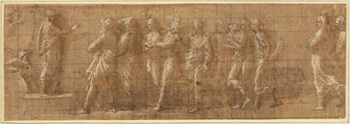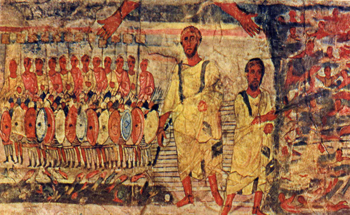The Stories We Tell
by Debie Thomas
For Sunday, November 9, 2014
Lectionary Readings (Revised Common Lectionary, Year A)
Joshua 24: 1–3a, 14–25
Psalm 78: 1–7
1 Thessalonians 4:13–18
Matthew 25: 1–13
The Christian community I grew up in traces its roots back to the first century, A.D. According to history (or legend — depending on whom you ask), the Apostle Thomas sailed to South India in A.D 52, intending to preach to the Jewish colonies near Cochin. Over the course of twenty years, he followed the coastline south, winning hundreds of followers in the villages of my ancestors. Eventually, he crossed the subcontinent to Mylapore, on the west coast near Madras, and was martyred. Contemporary Indian Christians still venerate Mylapore as the apostle’s official resting place, and many hundreds make pilgrimages to the site each year.
This account of St. Thomas' mission is one of the foundational "God- stories," I grew up on. As a child, I'd hear my elders refer to it as evidence of God's longstanding care for "our people." When times got tough, we'd find comfort in the knowledge that our community's relationship to God dates back centuries.
Eastern Icon of St. Thomas. |
At the same time, the story often functioned in ways I can't be proud of. Sometimes it would be used to contradict the notion that India is a "Hindu country," or that its relationship to Christianity is tied to British imperialism. But sometimes we'd use it to assert our superiority over other believers. To call ourselves "St. Thomas Christians" was to claim a more venerable spiritual pedigree than the West's. It was also to differentiate ourselves from "converts" — latecomers to Indian Christianity who'd never achieve our religious status, no matter how fervently they embraced their new faith.
The trouble with our God-stories is that they are both beautiful and broken. Both essential and dangerous. In this week's Old Testament reading, Joshua and the Israelites exchange dramatic God-stories of their own — vivid narratives of their ancestors' experiences with Yahweh — and their exchange culminates in a moment of decision: "Choose this day whom you will serve," Joshua challenges his followers. "Whether the gods your ancestors served in the region beyond the River or the gods of the Amorites in whose land you are living; but as for me and my household, we will serve the Lord."
The stories Joshua and the Israelites exchange in this passage are painful for modern readers to deal with. They include unsparing descriptions of plagues, drownings, curses, and genocidal conquests. While they celebrate a God who protects his children, they also describe him as tribalistic, wrathful, and violent. When the Israelites answer Joshua's challenge with a hearty decision to serve God, they base their decision on a God-story that makes me cringe: "The Lord drove out before us all the peoples, the Amorites who lived in the land. Therefore we also will serve the Lord, for he is our God."
In a 2009 TED talk entitled, "The Power of a Single Story," Nigerian novelist Chimamanda Ngozi Adichie describes her early attempts to write fiction as a child. Every story she wrote, she says, featured snowy landscapes, and children with blond hair eating apples. This despite the fact that she'd never seen snow, didn't have blond hair, and spent her Nigerian childhood eating mangoes, not apples. The trouble was that she'd grown up only reading American and British children's literature — she'd had no access to books written by African authors. She didn't know, therefore, that people who looked and lived like her could populate the pages of literature.
Years later, when she came to the United States, she confronted the same problem, this time in reverse. Her college roommate was stunned that Adichie could speak English, enjoy American pop music, and operate a stove. In other words, the roommate had inherited a single "story" of Africa — a story of AIDS, famine, and ethnic cleansing. It was not a story roomy enough to accommodate Adichie.
The danger of the single story, Adichie concludes in her TED talk, is that it "robs people of dignity. It makes our recognition of our equal humanity difficult." It makes one story "become the only story."
 |
Joshua at Shechem (Raphael, fresco made in the Vatican palace). |
But here's the dilemma: we are called by God to tell our stories. "We will tell to the coming generation the glorious deeds of the Lord, and his might, and the wonders that he has done," the Psalmist says in this week's reading. God commands each generation to share its stories, so that many generations yet unborn will "set their hope in God."
How do we faithfully but respectfully share our God-stories? How do we untangle beauty from brokenness in the stories we tell and hear?
The problem isn't a new one. The ancient rabbis who studied the Torah faced a similar challenge when they confronted difficult texts, texts they couldn't jibe with the God they knew. Their solution was midrash, a vast body of interpretative literature tied to the Hebrew Bible. Midrash asks questions, fills in gaps, and offers provocative counter-narratives to the ancient Israelites' God- stories.
In one of my favorite examples, the rabbis revisit the challenging story of the Red Sea Crossing. How, they wondered, could they reconcile the drowning of Pharoah's army with the merciful character of God? One midrash (Babylonian Talmud Megilla 10b) offers this possibility: that when Moses' sister, Miriam, began to sing God’s praises after the crossing, the angels in heaven took up the song, but God refused to join in the celebration. Instead, the angels found God weeping. When they asked why he wasn't celebrating, too, God responded, “My creatures are drowning in the sea and you want me to sing praises?”
In another variation, the angels pressed God further, asking why he didn't silence the jubilant Israelites. God responded that the Israelites were human beings whose lives and freedom depended on the victory they'd just gained. They needed to sing and dance. But God would mourn.
 |
Crossing the Red Sea (fresco from Dura Europos Synagogue). |
Though we might not realize it on a day-to-day basis, the stories we tell, and the gods we come to choose or reject, are powerfully linked. When the Israelites ceased to be landless nomads and became a people of power, they had to choose between a God who'd turn a blind eye to their violence and tribalism, or a God who'd call them to account when they oppressed the stranger, ignored the widow, and mistreated the orphan. And lest we think our choices are any less stark, Old Testament scholar Walter Brueggemann offers this corrective: "What is before us in our society, as it was before Joshua and his companions, is a life-or-death decision about God and neighbor. The God-decision is a recognition that we are not autonomous to do whatever we may want to do. The God of covenant is no therapeutic push-over who benignly accepts selfish anti-neighborliness and the cheapening of the human fabric. The neighbor-decision is an awareness that the ones unlike us merit, because they are present, inclusion in the goodies of the community."
Stories matter. More importantly, as Adichie puts it, "many stories matter." Why? Because while God is in each our stories, he'll never be contained by them. The God who sings on one side of the Red Sea, mourns on the other. The faith that came to my ancestors through the Apostle Thomas is only one thread in India's vast (and messy) religious tapestry. The God some Christians find in the quiet elegance of liturgy, others find in the exuberance of praise songs and tambourines.
To hold our stories reverently but lightly, to let them exist in full and creative tension with each other — this, I think, is what we are called to choose as Christ's followers. "Choose this day whom you will serve." May we choose a God who is unimaginably bigger than the stories we tell. A God whose every story begins and ends in love.
Notes:
1. Adichie, Chimamanda Ngozi. "The Power of a Single Story." TED Talk, October 2009.
2. Brueggemann, Walter. "Making the God Decision." Huffington Post — Religion. November 2, 2011.
Image credits: (1) Wikipedia.org; (2) ArtBible.info; and (3) Wikipedia.org.





